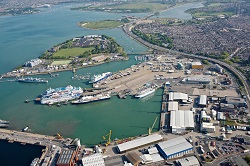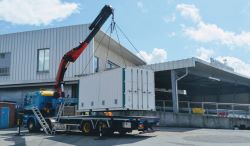PESO: Port Energy Systems Optimisation project update

The PESO (Port Energy Systems Optimisation), project which is piloting smart energy technologies at Portsmouth International Port is now 1/3 of the way through its 2-year duration. The project, which is co-funded by Innovate UK is aiming to show how ports can use smart grid technologies and sophisticated management software to reduce atmospheric emissions and improve air quality whilst optimising energy costs. Background information on the project and its partners can be accessed here.
The PESO pilot system being deployed in Portsmouth International Port will integrate local electricity generation, novel energy storage and smart energy management to demonstrate how ports can meet emerging on-shore power demands and the requirements of ships as they increasingly use shore power and adopt electric propulsion whilst minimizing the need for expensive grid upgrading and optimising the use of variable tariffs.

Three main areas of innovation will be explored in the PESO pilot; the design and construction of novel dual-chemistry battery technology to meet the port requirements; advanced management software to optimise onsite energy generation and storage and the development of smart port grid infrastructure.
The project has achieved some significant milestones:
- Specification of the business requirements for the PESO energy storage system control system, to minimize risk by ensuring that Swanbarton’s solution, meets the stakeholders’ business needs, without unnecessarily constraining the design or detailed functionality of the system.
- Definition of evaluation metrics to assess the fulfilment of the project objectives with regards to the local energy system and its potential to provide services to the network.
- Installation of a GS Yuasa Gemini dual chemistry energy storage system in Portsmouth International Port.
- Definition of the technical architecture for the ESS control system.

Swanbarton and Portsmouth International Port are now focussed on completing the PESO interface and control system and developing the machine learning and artificial Intelligence elements, so the system can learn how best to use, store and distribute energy around the port, including that generated by 750KWp of solar panels that will be installed during the project. The port will eventually use this system to support a fleet of electric port light goods vehicles.
MSE International are working with Energy Systems Catapult to assess the energy demand in UK ports and create value propositions to support wider adoption of the PESO solution. The work will focus on shore power requirements but it will also take into account energy demand from other sources, like freight transport that operates around the port area. The current and future power requirements will be assessed. Synergies with local industrial activities, renewable energy generation and transport will be investigated. This will create the evidence base for integrating storage solutions in ports to support their pathway to decarbonisation.



